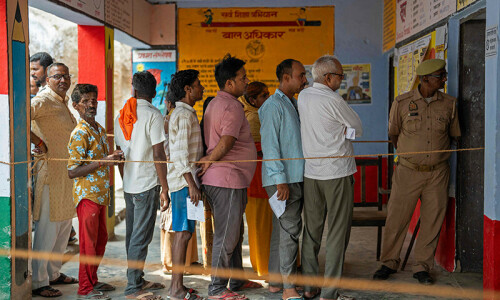NEW DELHI: Indian Prime Minister Narendra Modi pledged on Thursday to provide bank accounts to 75 million people by January in an ambitious bid to end “financial untouchability” in the nation of 1.2 billion people.
Mr Modi, who pledged this month to provide accounts for all, said 68 per cent of India’s population did not have access to banks, leaving millions of poor vulnerable to unscrupulous money lenders.
“If 40 per cent of our population can’t get into the mainstream, we can’t develop,” Mr Modi said, in a grand unveiling of his flagged financial inclusion initiative.
“If Mahatma Gandhi talked about social untouchability, to tackle poverty, we have to end financial untouchability,” he told a gathering of ministers and media personnel.
He made the pledge in his Independence Day speech after sweeping to power at elections in May on a platform of reforming and reviving the ailing economy.
While the drive for universal banking access dates back decades, India is still far from its goal. Now Mr Modi is taking a personal stake in the quest.
Despite winning the biggest mandate in 30 years, his rightwing government has not yet introduced big-ticket reforms that are needed to trigger economic growth.
Mr Modi said 75 million bank accounts would be opened by mid-January, with the new holders given a debit card, accident insurance worth up to Rs100,000 and life insurance of Rs30,000.
“Sixty eight years after our independence not even 68 per cent of the population has got bank accounts,” said Mr Modi, adding that he had emailed 700,000 bank employees urging them to support the initiative.
He said welfare payments would be transferred directly into the new accounts which would help in the “fight against corruption”.
The direct transfers are aimed at reducing waste and corruption that hike India’s multi-billion dollar subsidy bill for food, fuel and fertiliser for the poor.
Experts say there are many hurdles to achieving Mr Modi’s goal, among them a lack of identity documents among poor people.
Would-be bank customers have to produce a host of documents from birth certificates to residence proofs that many Indians do not possess.
Indians have one of the world’s highest household saving rates, but the central bank says just 35 per cent of the savings go into the banking system.
Microfinance institutions, which loan small sums to those unable to get credit from mainstream banks, have sought to step into the breach, but have been criticised for exorbitant lending rates, adding to already high poverty levels.
Published in Dawn, August 29th, 2014











































